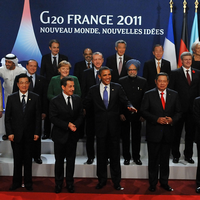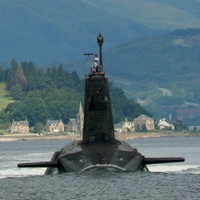Increased U.S. funding to fight drugs and organized crime in Mexico and Central America has attracted a good deal of attention in recent years. But flying largely under the radar is the growing role being played in that effort by the U.S. military, most notably now in Honduras, where U.S. Marines are engaged in a joint training exercise with Honduran troops and the Pentagon is financing a new naval base. “There’s been a noticeable uptick in U.S. military aid and cooperation in Honduras during the past year,” says Adam Isacson, senior associate for regional security policy at the Washington Office […]
North America Archive
Free Newsletter

With huge hydrocarbon finds being unearthed in both conventional and unconventional sectors across the Americas, energy independence is being hyped to epic proportions in the United States. The scorecard now shows 6.5 trillion unconventional barrels of oil in the Americas, running from Canada all the way to Argentina, versus 1.2 trillion conventional barrels in the Middle East and North Africa. The U.S. and Brazil sit comfortably in the middle of the expected windfall, and even Mexico, long lost to the annals of hydrocarbon blunders, boasts major new unconventional reserves. Given the awesome scale of these figures, it is hardly surprising […]

In July, a group of prisoners in the Security Housing Unit (SHU) of California’s Pelican Bay State Prison went on a hunger strike to protest their conditions of confinement. Central to the prisoners’ complaints was the fact that for years and, in some cases, for decades, they have been held in prolonged and indeterminate solitary confinement with few privileges and opportunities to engage in productive programming and activities. Importantly, as one prisoner put it in a letter to the informational website Solitary Watch, they were asking for “human justice, . . . fairness, compassion, positive reform, dignity . . . […]
Police in Brazil recently purchased several unmanned aerial vehicles to monitor environmental crimes such as deforestation and illegal fishing. In an email interview, Tyler Wall, a professor of criminal justice at Eastern Kentucky University, discussed the nonmilitary uses of drones. WPR: What are some of the potential nonmilitary applications of drones? Tyler Wall: Unmanned Aerial Vehicles (UAVS) are being deployed in a variety of nonmilitary spheres, albeit in limited capacities. Examples include the use of drones for domestic policing and border patrol; natural-disaster assistance; and monitoring wildlife, crops and the weather. WPR: To what degree are these potential uses being […]
The successful launch this week of a Russian spacecraft carrying an American and two Russians to the International Space Station may have eased anxieties about the future of U.S. and Russian space programs. But the reprieve is likely temporary, since it followed two recent Russian space failures — the August crash of an unmanned cargo ship and the malfunction last week of an unmanned Mars probe — as well as a string of failed satellite launches. The failures are attracting mounting scrutiny, since the U.S., which scrapped its Space Shuttle program earlier this year, now depends on Russia to ferry […]

For many, Veterans Day will bring parades honoring those who have served as well as a chance to pause and reflect upon those who are willing to pay, and have paid, the ultimate cost of service to the nation. This year, however, a disturbing trend should also be noted: For the second year in a row, however, more U.S. troops were lost to suicide throughout the force than to combat in Afghanistan or Iraq. A new report (.pdf) by the Center for a New American Security (CNAS) highlights the severity of this troubling problem: – An active service member takes […]
The need to bring order to America’s finances has made defense budget cuts unavoidable, with the question now turning to where and how much to cut. A recent CNAS report offered some granular — and alarming at the high end — details in terms of how various levels of cuts would impact U.S. military capabilities. Now two articles in Foreign Affairs bring into focus a more reassuring view of both defense austerity, which Benjamin J. Friedman likens to “the best possible auditor,” and retrenchment, which Joseph Parent and Paul MacDonald deem to be the most promising way for an overextended […]

In the wake of last week’s G-20 Summit in Cannes, France, a number of commentators have weighed in on the U.S. response — or lack thereof — to Europe’s ongoing financial crisis. Most notably, articles in the New York Times and the Los Angeles Times suggested that the lack of a U.S. contribution to Europe’s bailout fund is a clear sign of American decline. As further support for the “decline narrative,” both trot out examples from the 1990s, when the U.S. led the way in bailing out Mexico and East Asian countries as financial crises gripped their economies. Yet, on […]

Power is the ability to affect others to obtain preferred outcomes, and that can be done through coercion and payment or attraction and persuasion. Generally, people associate coercion with military power resources, but that is too reductive. After all, economic power resources can also be used for coercion. Even in terms of what is considered “normal” economic behavior, the boundaries are not always so clear. As Thomas Schelling has argued, “The difference between a threat and a promise, between coercion and compensation, sometimes depends on where the baseline is located.” After all, once compensation becomes an expectation, withholding it for […]

No credible international affairs specialist would contend that the 2012 presidential election will hinge on U.S. foreign policy, given the state of the U.S. economy and the widespread social anger that one sees bubbling up across the country. What’s more, Americans — if not Beltway partisan pundits — have achieved a certain sense of consensus on foreign policy under President Barack Obama, whose leadership has displayed a palpable “give them what they want” dynamic that reflects his desire to keep overseas issues on the back burner while he focuses on domestic ones. That last part should not be mistaken for […]

Proponents and opponents alike of defense budget cuts have spilled much ink lately. The debate will spike even further over the coming months as the actual budget is submitted to Congress for passage, and as Congress’ “super committee” for identifying long-term deficit-reduction measures gets closer to its deadline that, if missed, would mandate automatic defense cuts. As with other topics, however, the Washington defense budget debate seems to be occurring in a vacuum, not taking much account of the rest of the world, nor the implications of the spending decisions on potential adversaries’ strategies. In putting the debate into its […]
The recent arrival of a Chinese navy hospital ship carrying doctors and medical supplies to treat the needy in Jamaica flew mainly below the radar of mainstream American media. But the People’s Liberation Army’s “Peace Ark” mission highlights the delicate balance China is seeking to strike as it tries to show off its growing global military capability and boost its influence in regions once exclusively dominated by the U.S. military, without triggering suspicion and alarm in Washington and elsewhere. “In some sense this underscores that you can’t put China in just a regional category any longer,” says Jonathan D. Pollack, […]

The sinking of the South Korean corvette Cheonan in March 2010 reignited global concerns over the proliferation of submarine technology. Although the total number of submarines in service worldwide has declined since the end of the Cold War, largely because of the disappearance of the Soviet navy and a reduction in U.S. forces, the number of countries operating relatively advanced submarines has increased. The People’s Liberation Army Navy (PLAN) in particular has expanded the size and sophistication of its undersea armada. At the same time, capabilities for fighting submarines have atrophied. Altogether, these trends suggest an alarming degree of uncertainty […]
